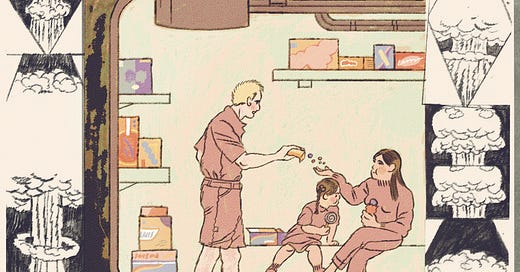Doomsday Preppers Still Want Dessert
An excerpt from our new issue, Candy Land, by Amy Rose Spiegel
Cake friends,
What would you put in your doomsday bunker? Purified water and first aid supplies are essentials, and for some of the most ardent preppers, so is candy.
In our newly released summer issue, Candy Land, Amy Rose Spiegel takes us inside the minds of the survivalists stockpiling Three Musketeers bars. Their rationale extends far beyond a shelf-stable sugar rush: The knowledge that human vice is an inexhaustible resource, even in the apocalypse. Read on for a full excerpt of her piece, “Finding Sweetness at the End of the World.” If you enjoy it, please consider supporting our work by ordering a copy of the magazine. And if you’re in NYC, keep an eye out for our launch party tickets, dropping soon!
Finding Sweetness at the End of the World
“My wife is absolutely obsessed with Three Musketeers bars,” says Sam Livengood, a thirty-six-year-old doomsday prepper living in the Appalachian Mountains. “I have a huge stockpile of those in case something happens and I know I can’t go to the gas station or grocery store and pick one up. I guarantee that’ll put a smile on her face, eventually.”
We’re talking on the phone as Livengood watches over his children, who are four and five—too young, he tells me, to understand why, exactly, their freezers are crammed with enough chicken nuggets and French fries to feed an entire preschool of picky eaters for a month. Rather than hoarding the dried beans and protein sludges I picture when I think of end-times cuisine, Livengood makes sure his munitions are aligned with his family’s prelapsarian tastes. “For me? It doesn’t really matter. I can eat anything—as long as I can keep going, we’re fine. That’s basically how I live life every day anyway. But something that makes them happy makes me happy, and I see that as a luxury,” he says.
I don’t tell Livengood, but my greatest fear is the apocalypse. Not dying—it’s okay if I bite it individually—but living through mass structural collapse. Three suns flicker in the sky; the Brooklyn Bridge is melting. I’m impotently dragging the couch in front of my front door as a blockade. Despite his best intentions to project an air of calm, the mayor weeps on the local news before the TV signal suddenly blinks out: that kind of a zone.
What scares me about the apocalypse is the threat of pleasure-annihilation—a jagged turn toward sheer survival. Having a great time is my primary motivation. I eat Reese’s Take 5 bars for breakfast at least once a week. I wrote a whole book about sleeping around as a personal belief system, and half my paycheck goes to poisoning my hair until it’s the color of a spotlight. While I usually see nihilism as the thought-mode most conducive to my way of being—if nothing matters, why not party, try to Live My Values, and otherwise fully orient myself around beauty?—I’d prefer not to have that “logic” stress-tested by napalm or, like, revenants.
Unlike me, many preppers aren’t afraid of the apocalypse. They’re ready. Some of them are even planning to enjoy it. One late night, freaking myself out online for fun, I learned that it’s fairly common for end-timers to ferret away candy alongside their toilet paper and firearms. Reviewing TikTok and Reddit posts from the fringe, I wasn’t cheered to learn that Red Hots last indefinitely—Red Hots suck—but freeze-dried Skittles? Potentially something to survive for! Preppers use the short- hand “SHTF”—when “shit hits the fan”—as a catchall for whatever cataclysm awaits us: nuclear war, alien invasion, dystopia of any flavor. In anticipation of the big one, they amass supplies. SHTF staples include water filters, portable generators, fireproof blankets, and MREs (“Meal, Ready-to-Eat”—dehydrated food bricks that busy militaries eat on the go). Plus . . . Peanut M&M’s or Warheads, or whatever their favorite candy at checkout might be.
The most seasoned survivalists, especially, have these extravagances. “The nice thing about being a prepper for several years is that I have most of the necessities stocked up, so I have the luxury of prepping ‘non-essential’ items—creature com- forts,” Elizabeth Villa, a forty-five-year-old prepper in Wisconsin, tells me via email. “I dry-can hot chocolate powder. I prep a lot of hard candy, like Jolly Ranchers.” (I picture a person in a hazmat suit dejectedly pawing through an oil drum of grapes and watermelons—last-resort flavors, even in the abundant present.)
Not all of Villa and Livengood’s life-sustaining frivolities are edible. “Lotion is my must-have, so I make sure to have plenty of my favorite kind stocked up,” Villa writes. Given his kids, Livengood’s more concerned about how to mollify them when tablets are kaput. “We have board games out the wazoo. I have old-school TVs and Nintendos and PlayStation 1, PlayStation 2 games. That makes it easy,” he says. “Those actually don’t use as much power as you think. Running off of a [solar generator’s] battery backup, you could actually get an hour a day out of that, conservatively, to get somebody some entertainment—and to stop thinking about what’s going on in the world around them.”
In addition to delighting themselves and their loved ones post-Armageddon, Livengood and Villa will rely on weaklings like me—ill-equipped fools for pleasure, and particularly those with the bad sense to live in overrun, strapped cities—to fill in whatever gaps emerge in their survival strategies. To come knocking with whatever we have in hand when their more essential supplies begin to thin. They know that once the global banking system is just a funny memory, it’ll be time to cut some deals on the ground. While you’ll eventually run out of batteries, human vice is an inexhaustible resource. Good, cheap fuel that burns clean.
“I have a list of barter items: airplane-size bottles of liquor”—it’s better to trade individual nips, rather than pour from a big handle, since people will insist on taking the whole bottle if they see you have lots of alcohol—“tobacco and rolling papers, candy, and cocoa. Decks of cards,” Villa says. “Coffee will become as valuable as gold if SHTF for any extended period. When times are hard, the smallest pleasures can hopefully keep people mentally prepared to survive.” That’s noble—and strategic. In times of societal collapse, delicacies and distractions can be traded for gasoline or tampons.
Livengood anticipates that other people’s desires will become his family’s provision and protection. It’s a baked-in part of his system: Excess is both valuable and expendable. “Barter with luxury items—not something you need to sustain your life, but something that someone else might need to boost their morale,” Livengood explains. “If somebody’s wife is raging for a chocolate bar, they might do anything they can to get one to make her happier for a small amount of time. You might end up getting something you actually need, versus something that they wanted.”
Offering your spouse or young children a pocket of joy in a waking hellscape is pragmatic. So is counting on others’ desperation for escape of any kind, and promising them momentary relief—and even optimism—in an otherwise joyless wasteland. “Luxury items—chocolate, anything that you get pleasure from every day—it’s nice to have after it all hits the fan,” says Livengood (who doesn’t indulge in swearing). “It gives you hope that something like that might come back.” With a Three Musketeers bar, he’ll be able to offer a taste of the ultimate luxury after The End: time travel. Here is the world, as it was.
Amy Rose Spiegel is the author of Action: A Book About Sex. Her favorite animals include gummy bears and human beings.
Want to support Cake Zine’s independent work? Subscribe to this newsletter and order a copy of our latest issue, Candy Land.




